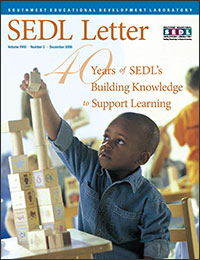Importance of Family and Community Involvement Continues to Grow
During the past few years, family involvement has been in the spotlight like never before. NCLB supports the idea that involved and informed parents can help make schools better, while research findings have reiterated the importance of parent and family involvement in a student’s achievement.
SEDL’s work in the field of school and community involvement in schools began in the late 1970s and early 1980s as the influx of mothers into the workforce began to influence the structure of families and the role of families in education.

We undertook three projects that sought to study and help improve relationships among schools, families, and communities. The most significant work by SEDL in the field was its ground breaking 6-year study of beliefs and attitudes toward parent involvement in their children’s education at the elementary level. Former program manager David Williams who worked on the study, says, “The results revealed that parents and educators had different views about parents’ involvement in their children’s elementary school education. Educators were most comfortable with parents being involved in traditional roles, such as volunteer or receiver of information, whereas parents were far more interested in nontraditional roles such as co-decision maker and school advocate.”
Since then SEDL has developed numerous products and tools to support school, family, and community partnerships that support student achievement, including the Collaborative Action Team process and Beyond the Building, a multimedia toolkit designed for educators and community organizers to learn to facilitate family and community involvement in schools. The family and community work laid the foundation for SEDL’s work in the National Partnership for Quality Afterschool Learning. SEDL has also recently teamed up with the Harvard Family Research Project in a new initiative to serve as the national coordinator for the 60 Parental Information and Resource Centers (PIRCs).
Next Article: SEDL and the Harvard Family Research Project Team Up to Provide Technical Assistance to PIRCs

